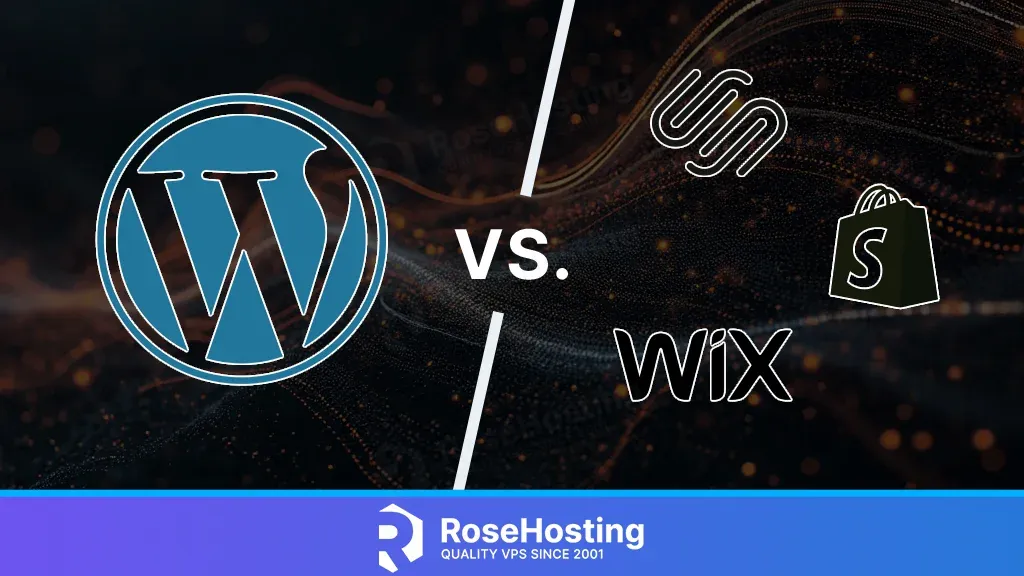
Stacking up WordPress vs web builders such as Squarespace, Wix, and Shopify is a question asked often. Various comparisons of hosted CMS solutions against all-in-one web builders have been made with varying degrees of accuracy. They all do a serviceable job when it comes to hosting a website. However, there are a few differences to be aware of.
Without further ado, let’s get into it.
It’s no secret that we prefer open-source CMS platforms to web builders, and there are good reasons for that. Web builder companies such as Squarespace, Wix, and Shopify purposely withhold and hide crucial information from you. They’re not open at best and are downright disingenuous in the language they use at worst. Unfortunately, the things left unsaid can have dire consequences for your business down the line.
Table of Contents
Locked In Until Death Do You Part
The biggest issue with web builders that their marketing chooses to omit is that once you sign up, you’re stuck for life! If you set up a website with them, despite their claims you own your data, you can never move away. You cannot move away tomorrow. You won’t be able to move away in six months. Not even 25 years later. It doesn’t matter if a future technology puts their platforms to shame. Your site is stuck with them, and you have to continue paying every month for a restrictive service.
You could start your site from scratch by building it on a new platform. In doing this, your SEO work, past analytics, and customer conversion history will be gone. If your business primarily relies on SEO, this could destroy your revenue stream and business. Not to mention the development costs of designing a second website from scratch. It’s better and more cost effective to just get things right the first time.
WordPress vs Web Builders for Page Load Times
Google PageSpeed Insights lets you view webpage performance data over the past 28 days. It is a typically accurate indicator of how quickly your pages load on mobile and desktop devices worldwide. It can sometimes show misleading numbers depending on your cache. Running the test a few minutes later should correct this. However, the topmost section is crucial, showing whether your core web vital assessment has passed or failed. This data is compiled over the latest 28-day collection period and is used directly in SEO algorithms.
We’ve seen several cases where websites moved to a web builder platform only for their page load times to increase sky-high. Typically, these decisions were driven by third parties, such as agencies, who profited from affiliate kickbacks. Alternatively, new staff members pushed the move to platforms they were “previously used to.” Unfortunately, in every instance, the lack of research costs the client time and money.
Moving to these platforms can plummet web performance despite exceptional on-page SEO. If this continues across 28 days, Google and other search engines will use those numbers as a ranking factor. This means a significant ranking downtrend will occur within a few weeks to a month.
A 2020 study by Deloitte titled Milliseconds Make Millions shows how impactful page load times are to your bottom line. It was so impactful that it has become a popular eCommerce marketing catchphrase.
The Hidden Costs of Web Builders
The third issue with using web builders over self-hosted CMS solutions is the abundance of hidden fees and accumulating costs. This is particularly noticeable in e-commerce situations. You may be forced to pay additional monthly fees for using multiple currencies, languages, or other non-out-of-the-box features. If you’re forced to move, make sure you read their terms and conditions extra carefully. More importantly, look at any features promised for free. Are they just a one-year hook or something that will remain for free for life?
Finally, reviewing user reviews on sites like G2 or social media platforms can help you identify hidden costs you haven’t considered. Similarly, you can review whether that specific platform has increased its regular pricing in the past. If it retains its sign-up pricing for legacy customers, that’s a massive plus. On the other hand, do they upgrade their equipment and service, or are you stuck on 10-year-old outdated servers?
Conclusion
As we mentioned in our opening, any of these services will host a website for you. Web builders have the added benefit of a two-in-one build and host platform, though it comes at a high price. You cannot quickly move your site to a new platform or technology. Think of it this way. You built an HTML website 25 years ago and cannot migrate to WordPress today without destroying your SEO? Your options are to watch your outdated site design slowly lose traffic and customers or to take a massive hit now for long-term pay-offs.
We will always advocate for platforms that treat you fairly. One that locks you in through the quality and improvement of the product, not the terms and conditions you accept at signup. Platforms you can migrate to and from at will, such as WooCommerce and WordPress vs web builders. Not to mention that the “builder” element of web builders is only helpful in the very initial stage. After that point, your hosting becomes overpriced, with a feature you don’t need as your site is already built. Considering the long-term cost, you’re better off paying a designer for a custom WordPress theme every three to five years. It will cost you less time and money, and you’ll have regular clean, and professional designs to refresh your brand. Most importantly, you’ll own your data and can do anything you want with your online presence.